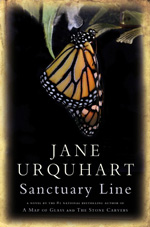

McClelland & Stewart, hardcover, 9780771086465
In her seventh novel, Sanctuary Line, acclaimed Canadian writer Jane Urquhart returns to her familiar themes of transience and memory. As with her earlier works, Urquhart's prose sparkles on the page to create an atmospheric, dreamlike book that at the same time conveys a sense of verisimilitude to actual lives. In this novel, the narrator Liz is an entomologist who is studying Monarch butterflies while living alone in the family home where she spent her childhood summers. The house, once owned by her uncle and aunt, stands in the midst of fruit orchards. Returning to the farm is a catalyst for Liz to remember and analyze the events and people who influenced her formative years. It is here that she had developed a sisterly relationship with her cousin Mandy Butler, who grows up to join the Canadian military and is later killed in Afghanistan. It is also here that she experienced her first feelings of love when she developed a reciprocal crush with Teo, the son of a migrant Mexican labourer who, like the butterflies, returned to the farm each summer.
At first I was puzzled by why Urquhart's deeply introspective narrator was only in her forties rather than the usual literary trope of an elderly person remembering her life. As I read, however, I saw that Liz wasn't reflecting on just her own life, but also the lives of her extended family and ancestors. Many of the so-called memories are actually family legends about long-deceased relatives that she calls the "great-greats." Together her memories and these legends build a picture of the demise of a family that had once held great promise. For Liz, and for Urquhart, life is as ephemeral as a butterfly's wings.
These legends go off on tangents, some of which were my favourite parts of the book. Two of the most entertaining involved lighthouse keepers in her family. In the first, Liz tells the story of Butler the Keeper who manned the lighthouse on the windy Skellig Islands of western Ireland, battling constant storms and the ghosts of sixth century monks. In another vignette, Urquhart amusingly weaves another lighthouse-keeping ancestor into the Stephen Crane story "The Open Boat," and I found the scenario truly laugh-out-loud funny. The main thing that I've loved about Urquhart's writing is her masterful use of motifs and symbols. Sanctuary Line did not disappoint in this regard. As with some of her previous novels, she again uses reflections and refractions from glass, mirrors and water to beautifully express her themes. In her past books set on the shores of the northern Great Lakes, Urquhart used reflective surfaces to convey a sense of icy cold and perpetual, frozen winter. But in Sanctuary Line, she has thawed out her world, and takes the reader to the southern reaches of Ontario—a latitude even with Rome, Italy—and memories of humid summers spent swimming in Lake Erie. Despite the intense introspection that Liz spends on these fragments of memory, she is unable to reassemble them into a whole family again. Just like her aunt's broken glassware collection, the family is irreparably shattered.
Sanctuary Line is not an easy book to summarize, as the whole is greater than the sum of its fragmentary pieces. It
belongs firmly under the description of literary fiction, and readers who don't have the persistence to allow the layers
of sketches build into a story may find themselves bored. But patience is rewarded: the last third of the novel is
especially compelling and everything comes together as secrets are revealed and questions are answered.
